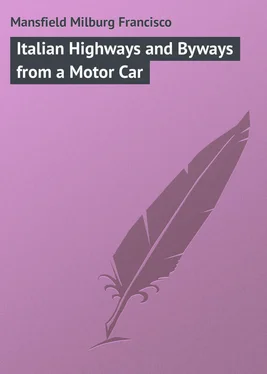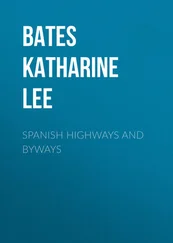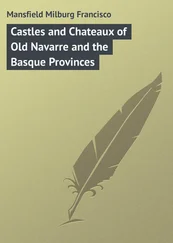Milburg Mansfield - Italian Highways and Byways from a Motor Car
Здесь есть возможность читать онлайн «Milburg Mansfield - Italian Highways and Byways from a Motor Car» — ознакомительный отрывок электронной книги совершенно бесплатно, а после прочтения отрывка купить полную версию. В некоторых случаях можно слушать аудио, скачать через торрент в формате fb2 и присутствует краткое содержание. Жанр: foreign_prose, Путешествия и география, на английском языке. Описание произведения, (предисловие) а так же отзывы посетителей доступны на портале библиотеки ЛибКат.
- Название:Italian Highways and Byways from a Motor Car
- Автор:
- Жанр:
- Год:неизвестен
- ISBN:нет данных
- Рейтинг книги:3 / 5. Голосов: 1
-
Избранное:Добавить в избранное
- Отзывы:
-
Ваша оценка:
- 60
- 1
- 2
- 3
- 4
- 5
Italian Highways and Byways from a Motor Car: краткое содержание, описание и аннотация
Предлагаем к чтению аннотацию, описание, краткое содержание или предисловие (зависит от того, что написал сам автор книги «Italian Highways and Byways from a Motor Car»). Если вы не нашли необходимую информацию о книге — напишите в комментариях, мы постараемся отыскать её.
Italian Highways and Byways from a Motor Car — читать онлайн ознакомительный отрывок
Ниже представлен текст книги, разбитый по страницам. Система сохранения места последней прочитанной страницы, позволяет с удобством читать онлайн бесплатно книгу «Italian Highways and Byways from a Motor Car», без необходимости каждый раз заново искать на чём Вы остановились. Поставьте закладку, и сможете в любой момент перейти на страницу, на которой закончили чтение.
Интервал:
Закладка:
The Italian peasant doesn’t live so badly as many think, though true it is that meat is rare enough on his table. He eats something more than a greasy rag and an olive, as the well-fed Briton would have us believe; and something more than macaroni, as the American fondly thinks. For one thing, he has his eternal minestra , a good, thick soup of many things which Anglo-Saxons would hardly know how to turn into as wholesome and nourishing a broth; meat of any kind, always what the French call pate d’Italie , and herbs of the field. The macaroni, the olives, the cheese and the wine – always the wine – come after. Not bad that; considerably better than corned beef and pie, and far, far better than boiled mutton and cauliflower as a steady diet! Britons and Americans should wake up and learn something about gastronomy.
The general expenses of middle-class domestic town life in Italy are lower than in most other countries, and the necessities for outlay are smaller. The Italian, even comfortably off in the working class, is less inclined to spend money on luxurious trivialities than most of us. He prefers to save or invest his surplus. One takes central Italy as typical because, if it is not the most prosperous, considered from an industrial point of view, it is still the region endowed with the greatest natural wealth. By this is meant that the conditions of life are there the easiest and most comfortable.
A middle class town family with an income of six or seven thousand lire spends very little on rent to begin with; pretence based upon the size of the front door knob cuts no figure in the Italian code of pride. This family will live in a flat, not in a villini as separate town houses are called. One sixth of the family income will go for rent, and though the apartment may be bare and grim and lack actual luxury it will possess amplitude, ten or twelve rooms, and be near the centre of the town. This applies in the smaller cities of from twenty to fifty thousand inhabitants. With very little modification the same will apply in Rome or Naples, and, with perhaps none at all, at Florence.
The all important servant question would seem to be more easily solved in Italy than elsewhere, but it is commonly the custom to treat Italian servants as one of the family – so far as certain intimacies and affections go – though, perhaps this of itself has some unanticipated objections. The Italian servants have the reputation of becoming like feudal retainers; that is, they “stay on the job,” and from eight to twenty-five lire a month pays their wages. In reality they become almost personal or body servants, for in few Italian cities, and certainly not in Italian towns, are they obliged to occupy themselves with the slogging work of the London slavey, or the New York chore-woman. An Italian servant, be she young or old, however, has a seeming disregard for a uniform or badge of servitude, and is often rather sloppy in appearance. She is, for that, all the more picturesque since, if untidy, she is not apt to be loathsomely dirty in her apparel or her manner of working.
The Italian of all ranks is content with two meals a day, as indeed we all ought to be. The continental morning coffee and roll, or more likely a sweet cake, is universal here, though sometimes the roll is omitted. Lunch is comparatively a light meal, and dinner at six or seven is simply an amplified lunch. The chianti of Tuscany is the usual wine drunk at all meals, or a substitute for it less good, though all red wine in Italy seems to be good, cheap and pure. Adulteration is apparently too costly a process. Wine and biscuits take the place of afternoon tea – and with advantage. The wine commonly used en famille is seldom bought at more than 1.50 lira the flagon of two and a half litres, and can be had for half that price. Sugar and salt are heavily taxed, and though that may be a small matter with regard to salt it is something of an item with sugar.
Wood is almost entirely the fuel for cooking and heating, and the latter is very inefficient coming often from simple braziers or scaldini filled with embers and set about where they are supposed to do the most good. If one does not expire from the cold before the last spark has departed from the already dying embers when they are brought in, he orders another and keeps it warm by enveloping it as much as possible with his person. Italian heating arrangements are certainly more economical than those in Britain, but are even less efficient, as most of the caloric value of wood and coal goes up the chimney with the smoke. The American system of steam heat – on the “ chauffage centrale ” plan – will some day strike Europe, and then the householder will buy his heat on the water, gas and electric light plan. Till then southern Europe will freeze in winter.
In Rome and Florence it is a very difficult proceeding to be able to control enough heat – by any means whatever – to properly warm an apartment in winter. If the apartment has no chimney, and many haven’t in the living rooms, one perforce falls back again on the classic scaldini placed in the middle of the room and fired up with charcoal. Then you huddle around it like Indians in a wigwam and, if you don’t take a short route into eternity by asphyxiation, your extremities ultimately begin to warm up; when they begin to get chilly again you recommence the firing up. This is more than difficult; it is inconvenient and annoying.
The manners and customs of the Italians of the great cities differ greatly from those of the towns and villages, and those of the Romans differ greatly from those of the inhabitants of Milan, Turin or Genoa. The Roman, for instance, hates rain – and he has his share of it too – and accordingly is more often seen with an umbrella than without one. Brigands are supposedly the only Italians who don’t own an umbrella, though why the distinction is so apparent a mere dweller beyond the frontier cannot answer.
In Rome, in Naples, and in all the cities and large towns of Italy, the population rises early, but they don’t get down to business as speedily as they might. The Italian has not, however, a prejudice against new ideas, and the Italian cities and large towns are certainly very much up-to-date. Italians are at heart democrats, and rank and title have little effect upon them.
The Italian government still gives scant consideration to savings banks, but legalizes, authorizes and sometimes backs up lotteries. At all times it controls them. This is one of the inconsistencies of the tunes played by the political machine in modern Italy. Anglo-Saxons may bribe and graft; but they do not countenance lotteries, which are the greatest thieving institutions ever invented by the ingenuity of man, in that they do rob the poor . It is the poor almost entirely who support them. The rich have bridge, baccarat, Monte Carlo and the Stock Exchange.
It may be bad for the public, this legalized gambling, but all gambling is bad, and certainly state-controlled lotteries are no worse than licensed or unlicensed pool-rooms and bucket shops, winked-at dice-throwing in bar rooms, or crap games on every corner.
The Italian administration received the enormous total of 74,400,000 lire for lottery tickets in 1906, and of this sum 35,000,000 lire were returned in prizes, and 6,500,000 went for expenses. A fine net profit of 33,000,000 lire, all of which, save what stuck to the fingers of the bureaucracy in passing through, went to reduce taxation which would otherwise be levied.
The Italian plays the lottery with the enthusiastic excitement of a too shallow and too confident brain.
Various combinations of figures seem possible of success to the Italian who at the weekend puts some bauble in pawn with the hope that something will come his way. After the drawing, before the Sunday dawns, he is quite another person, considerably less confident of anything to happen in the future, and as downcast as a sunny Italian can be.
Читать дальшеИнтервал:
Закладка:
Похожие книги на «Italian Highways and Byways from a Motor Car»
Представляем Вашему вниманию похожие книги на «Italian Highways and Byways from a Motor Car» списком для выбора. Мы отобрали схожую по названию и смыслу литературу в надежде предоставить читателям больше вариантов отыскать новые, интересные, ещё непрочитанные произведения.
Обсуждение, отзывы о книге «Italian Highways and Byways from a Motor Car» и просто собственные мнения читателей. Оставьте ваши комментарии, напишите, что Вы думаете о произведении, его смысле или главных героях. Укажите что конкретно понравилось, а что нет, и почему Вы так считаете.












